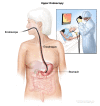A procedure in which an endoscope is passed through the mouth and down the throat into esophagus, stomach, and duodenum (first part of the small intestine) to check for abnormal areas. An endoscope is a thin tube with a light and a video camera attached. It may also have a tool to remove a sample of cells, tissue, or fluid so it can be checked under a microscope for signs of disease. An upper endoscopy may be used to help diagnose cancer and other conditions, such as Barrett esophagus (a precancerous condition), ulcers, gastroesophageal reflux disease, and celiac disease. It may also be used to remove polyps or other types of growths, stop bleeding caused by ulcers or other conditions, widen a narrow esophagus, place a feeding tube or drainage tube, or remove foreign objects. Also called EGD, esophagogastroduodenoscopy, upper gastrointestinal endoscopy, and upper GI endoscopy.

Figure
Upper endoscopy. A thin, lighted tube called an endoscope is inserted through the mouth and down the throat to check for abnormal areas in the esophagus, stomach, and first part of the small intestine.